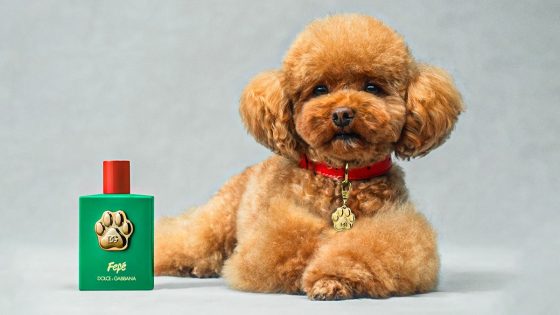Luxury fashion house Dolce & Gabbana created quite a hullabaloo on social media following the launch of a perfume—a first in their premium range of products. A perfume that is meant not for women, men, or even children; the new product is targeted at your pet—dogs, to be precise.
The new alcohol-free perfume for dogs is called ‘Fefé’, launched in honour of Domenico Dolce’s pet poodle, who goes by the same name. The mist ‘tailored specifically for dogs’ retails at a whopping $100 (Rs 9,000 approx).
Though D&G states that the product follows a Safe Pet Cosmetics protocol, it has raised quite a concern amongst pet parents and veterinarians.
A new addition to pet care?
India Today spoke to Harshitha Reddy, organiser of Petex India (a B2B2C pet expo), who mentioned that pet perfumes have always been a part of the pet care industry and that they’re not a recent trend. However, it all depends on the frequency of using the product.
“We sure did not have D&G perfumes for dogs before, but that doesn’t mean that pet sprays and mists did not exist at all. A dog’s sense of smell is crucial, so it’s important to consider quantity and frequency when using such products. Just like we douse ourselves in perfume, we shouldn’t do the same with our pets. It’s not something that should become a daily habit, but rather an occasional treat, perhaps for special outings,” says Harshitha.
Dr Manu Mishra, a veterinarian at Dr Paw Veterinary Clinic in Delhi’s Greater Kailash, says using dog perfumes isn’t really harmful if we keep in mind the ingredients and don’t make it a regular affair. “I recommend a water-based perfume. It won’t be long-lasting—perhaps up to four hours—but it’s safer. Most perfumes contain alcohol, which isn’t suitable for pets. A product that’s water-based with basic preservatives is safer for occasional use,” he says.
The concerns in general
Anupam Bhowal, a pet parent and entrepreneur, shares his apprehensions about dog sprays and perfumes and says, “There is no standard certification or government approval process to ensure that a product is pet-safe. While some products might claim to be free from alcohol, there’s no standardised way to verify that they’re skin-friendly or safe for all pets. Personally, I wouldn’t take the risk.”
While speaking, he also mentions why he is absolutely against the concept of having perfume for a pet. “A dog will only start to smell if there are underlying issues, such as skin problems, dietary issues, or poor hygiene. If these aspects are properly managed, a dog won’t have an odour. Trust me, a healthy and clean dog has no smell unless it’s wet or dirty. If you aren’t cleaning and grooming your dog properly, then yes, it will start to smell—just like a human would in the same circumstances,” he says.
“You don’t need to use perfume on a dog. The reason I say this is because dogs have highly sensitive senses. Even if a perfume smells pleasant to us, it can be overpowering and uncomfortable for them,” he adds.
Shivam Bamniyal, founder and CEO of Barket (an animal welfare community), also holds similar apprehensions. “I’m not in favour of perfume for dogs because it can cause a range of issues—from interfering with their natural sense of smell to causing irritation and even increasing the risk of cancer. A dog’s face, including their nose, skin, eyes, and ears, is incredibly sensitive and prone to irritation and infection from such chemicals.”
“Perfumes are generally created for human use, and I don’t see how they could be beneficial for any dog. If you want your dog to smell good, it’s better to use shampoos and grooming products that are safe for their skin and coat. If vets can assess the product and confirm that it uses natural oils rather than harsh chemicals, that should settle the debate for good,” Shivam adds.
What vets have to say
Federico Cocca, a Rome-based veterinarian, tells the Associated Press how using perfume on dogs could actually make things difficult for the vets. An ongoing dermatological disease can go undetected if dogs’ natural odours are covered up.
“In the case of sebaceous dermatitis, for instance, the smell somehow completes my diagnosis. If the smell of breath, the smell of earwax are disguised by the perfume, it could be a problem even for us vets,” Federico says.
However, Dr Manu Mishra suggests that while perfumes and sprays can be safe for animals, it’s important to follow two precautions: avoid using them regularly and opt for those made with natural ingredients.
“Look, some dogs have a foul smell in their anal region (some glands causing it) and their mouth. But as a vet, I will not recommend using perfume 24*7. It should be an occasional affair. Let’s say you are taking your dog out with you for a get-together or maybe a monthly outing. Keep the perfumes for specific occasions,” he says.
PETA weighs in
Elisa Allen, PETA UK’s vice president of programmes, tells India Today, “Dogs have an extraordinarily sensitive sense of smell – they have hundreds of millions more receptors in their nostrils and can smell 10,000 to 100,000 times better than humans – and can pick up scents a mile away, so squirting them with a fragrance designed to please humans, as this is, can upset them greatly.”
“Unable to shake it off, it can cause them irritation and distress and interfere with their ability to detect other smells in their environment and communicate with other animals they encounter. PETA advises dog guardians never to apply any scented sprays to their animal companions and reminds people to consider that our dogs love us just as we are – and we should extend the same courtesy to them,” Elisa adds.
Pet humanisation
During our conversation with Harshitha Reddy, the organiser of Petex India, we were reminded of a term that’s become increasingly relevant in recent years – pet humanisation. While the concept isn’t new, she mentions it peaked during the pandemic.
For those unacquainted with the concept, pet humanisation refers to the trend of treating pets as integral members of the family, or even as children, by adopting human dietary and lifestyle practices for them. This extends to dressing them up, accessorising their appearance, creating a personal space for them, indulging them with gourmet meals, purchasing bespoke (and sometimes pricey) pet care products, and in some cases, even naming them as heirs to their owners’ estates (just like Karl Lagerfeld did).
“The trend of pet humanisation has significantly impacted the pet accessories market, including perfumes. Since Covid-19, pets have become more integrated into our households, often regarded as family members, much like children. This shift has driven the demand for a wide range of pet accessories, from clothing to even jewellery. Pet humanisation is all about treating pets as part of the family, and this trend shows no signs of slowing down,” says Harshitha.
What needs to be understood is the fact that humans and animals are not the same. What looks good for you doesn’t mean it will be beneficial for your dog. Don’t try to impose human behaviour onto them—they are pets, let them be in their true character.
Paws for thoughts
You might need a spritz to survive your day in the office (or else five will drop dead), but your dog? They’re already rocking that natural charm. So, before you play pet stylist, just remember: some things are best left to humans. Perfume for your pet is not a necessity, it’s a choice!
Source Agencies



